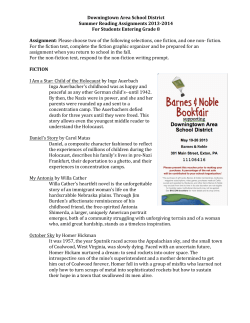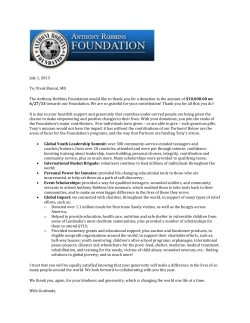
Use of Data Nazi Experiments from Nazi Medical Experiments
Use of Data from Nazi Medical Experiments Nazi Experiments • over 30 types of experiments • concentration camp victims • Nuremberg “doctors trial”, 15 of 23 doctors found guilty • hung for ‘crimes against humanity’ • experiments included studies of: altitude response tuberculosis freezing response transplantation twin studies sterilization poisoning insemination Sigmund Rascher Joseph Mengele Irma Grese High Altitude • 1942, 200 prisoners at Dachau • To help German pilots who had to eject at high altitude • Inmates placed in low pressure chambers to altitudes of 68,000 feet • Dissected brains while still alive to show the format-ion of tiny air bubbles in certain parts of the brain • 80 died outright, the other 120 prisoners were executed Fertility • Sterilize millions with minimal time and effort • Radiated male genitals; castration to see the effect on the testes • Caustic substances forced into uterus • Women were artificially inseminated at Auschwitz • Sometimes told they had been inseminated with sperm from animals and had monsters growing in them Freezing • To help German pilots who ejected into cold water or on Siberia front • Placed prisoners into vats of ice water for up to 5 hours; aviator suits or naked • Strapped naked prisoners outside in winter • Victims writhed in pain, foamed at the mouth, lost consciousness as core temp dropped to 79°F • Re-warmed w/sleeping bags, scalding water, naked women copulating with them Use the data ? “Based on what you know, do you think doctors and scientists should be able to use data from Nazi Death Camp experiments?” Yes l No “Holocaust On Trial” NOVA Online Feature http://www.pbs.org/wgbh/nova/holocaust/experiments.html 1 NO What if you knew that not publishing or using the data could strengthen the arguments of those who say “the Holocaust never happened”? NO What if you knew that such data could not be obtained today? • Data shouldn’t exist in an ethical world, but they do and could benefit humanity • Should the data simply be lost? "Dr. Rascher, although he wallowed in blood ... and in obscenity...nevertheless appears to have settled the question of what to do for people in shock from exposure to cold ... The final report satisfies all the criteria of objective and accurate observation and interpretation…The method of rapid and intensive rewarming in hot water should be adopted as the treatment of choice…” "I submit that we must put the Holocaust and the Nazi experiments directly under the floodlights…I maintain that it be exhumed, printed, and disseminated to every medical school in the world along with the details of methodology and the names of the doctors who did it, whether or not they were indicted, acquitted, or hanged. ... Let the students and the residents and the young doctors know that this was not ancient history or an episode from a horror movie...It was real. It happened yesterday. ... They tried to burn the bodies and to suppress the data. We must not finish the job for them.” Dr. Velvl W. Greene, professor of medical ethics at Ben Gurion Univ., Beersheba, Israel NO If you think the Nazi results are tainted by the way they were obtained, what if you knew that many deem information, per se, as morally neutral? "We are talking of the use of the data, not participation in these heinous studies, not replication of atrocities. The wrongs perpetrated were monstrous; those wrongs are over and done. How could the provenance of the data serve to prohibit their use?" The late Dr. Benjamin Freedman, formerly a bioethicist at McGill University in Montreal NO What if you knew that many survivors of the experiments think the data should be used? "Perhaps justice would ultimately be served if we were to allow life to emerge from the Nazi murders." Baruch Cohen, attorney and ethicist "As a child of survivors of the Holocaust, I have strong empathy for those opposed to the data's use. Nevertheless, as a physician who deals with children and has seen them comatose, brain damaged, and dead from hypothermia, my sense is that to save one child through the use of this information is worthwhile." Anonymous medical doctor Maj. Leo Alexander, U.S. Army doctor who served as aide to the chief counsel of the Nuremberg war-crimes trial NO What if you knew the data might save lives today? • Hypothermia experiments showed the import-ance of rapid rewarming • Nazi cooling curves help-ed determine how long coldwater suits can safeguard people at near-fatal temperatures • Scientists and physicians have gained information from other horrific events in history • Warsaw ghetto notes by Jewish doctors on starving children; later published as a landmark study on hunger • Hiroshima and Nagasaki survivors have offered an opportunity to study radiation sickness NO Might not using the data lend a belated dignity to the victims, so that their lives were not lost for nothing? • Put the information to good use to help the living • Best possible testimonial to the victims "The suffering is done -- let someone benefit from all the pain." Lucien A. Ballin, member of a military intelligence assault force that helped unearth Nazi medical-experiments data in 1945 "Of course, nobody in their right mind condones the experiment. The question is, Given that this fiendish thing was done, what do you do with the information that exists. ... I suspect that the prisoners would have wanted to have the information used to help somebody." Todd Thorslund, vice president of ICFClement, an environmental consulting company that wrote a risk-assessment report for the Environmental Protection Agency that cited Nazi phosgene experiments 2 YES YES What if you knew that the medical competence of the Nazi doctors has been questioned? • relinquished the right to be considered doctors • expertise questioned by their own countrymen "Of course I am a doctor and I want to preserve life. And out of respect for human life, I would remove a gangrenous appendix from a diseased body. The Jew is the gangrenous appendix in the body of mankind.” What if using the Nazi data could set a dangerous precedent, sanctioning unethical human experiments and possibly encouraging similarly deplorable acts? • Nazi doctors were a matter of degree, not type • South African doctors falsified death records of blacks killed under torture in prison • 1950-70s NYU infected mentally retarded children w/ hepatitis Dr. Fritz Klein, Nazi physician • Victims malnourished; physiological responses compromised • 1963 Jewish Chronic Disease Center in Brooklyn injected 22 chronically ill patients with ‘live’ cancer cells • Preconceived racial bias by doctors “… it could lead to a way of thinking that would condone taking some lives in order to save others." • Results can not be replicated Dr. Judith Bellin, an Environmental Protection Agency toxicologist YES YES What if you knew that many feel that using the data would make us the Nazi experimenter’s moral accomplices? • “retrospective torturers, retrospective guinea pigs” • further dishonor the victims "I consider it inexcusable to dignify those murderers with the word 'scientist' or dignify what they did with the word 'research' ... The data should be thrown to the winds and forgotten." Gisela Konopka, concentration-camp survivor "We must not add our numbers to the multitudes of onlookers who slept peacefully through the nights of anguished cries while dreaming their sweet dreams of a better tomorrow.” What if you knew just how much victims of the experiments suffered? • unfathomable fear, unbearable pain, senseless death • unfathomable fear, unbearable pain, senseless death "One cannot fully confront the dilemma of using the results of Nazi experiments without sensitizing oneself to the images of the frozen, the injected, the inseminated, and the sterilized." Baruch Cohen, attorney Dr. Willard Gaylin, psychiatrist and former president of The Hastings Center, a biomedical ethics thinktank YES What if the Nazi medical experiments had been conducted on your mother, your brother, your child? "I offer this challenge to the hypothermia researchers. As you page through the research, have next to it actual photos of Jews being tortured in the name of research and see how long you are able to analyze data. Better yet, think of your mother or father floating in that tank and see if your beliefs about this subject hold up." Use the data ? Of the 43,493 people who responded to this exam on the NOVA website: 64% said the data should be used 20% said the data should not be used 15% were undecided Rod Martel, whose grandmother died in a concentration camp 3
© Copyright 2025





















